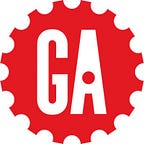Ace Your CV.
The Dos & Don’ts of Writing Your Resume.
We know that hiring managers spend an average of six seconds looking at your CV. So how do you make those seconds count? When drafting your CV how do you make it stand out from the rest? Lucky for us our outcomes team is just a slack message away.
They are responsible for helping our graduates land their dream job and are our expert CV vets in residence. We asked them to break it down for us, and in this two part series we’ll explore the dos and don’ts of CV writing so we can once and for all answer the question. How do I perfect my CV?
Admin
First things first, your name. Keep it consistent across all your deliverables. So the same name on your Linkedin, portfolio website, Github, Medium, whatever you’re using to promote yourself — no Madonna on one and Madge on the other.
On that note please, please make sure you’re using a professional email address. No hotmail accounts you set up when you were sixteen, keep it clean and simple — yourname@theemailproviderofyourchoice will do.
Make sure to include your current job title, where you are (city and start of a postcode) and your phone number although this last one is optional. Do not, under any circumstances include your photo, gender or date of birth. It’s not relevant information.
Experience and Skills
If you have a lot of experience, or have had a lot of different jobs try and stick to your most recent and relevant roles. No one needs to know about your first job stacking shelves at Morrisons.
For the roles you do include focus on your main achievements in the role, providing data and examples to illustrate your impact. You want your CV to demonstrate growth, and an increasing level of responsibility over the course of your career, but it is still important to clarify long gaps.
So we’ve covered experience, but how do you illustrate the skills you gained along the way? Our expert recommends that you list your skills in order of confidence, aligning those skills to what you have shown in the experience section.
Bonus points if you can match those skills up with the job specification. Start with Industry specific and technical skills first, then work your way down to soft, transferable and extra skills. Overall it should look something like this:
Make triple sure you’re only including skills you are totally confident in, so don’t list speaking fluent German as a skill if you can only say a few words, and only list skills you can provide evidence for in the experience section. For example, don’t say you are completely fluent in Adobe CC if you don’t or rarely use it in your current job.
Education and Optional Elements
Let’s talk about education and optional elements. When it comes to education you should include your university, degree and dates of graduation. You can list your thesis or any interesting projects. You could also mention any Online Courses and bootcamps you’ve attended, obviously including the school, dates and specific projects. If you have anything extra that really adds to your application — any extracurriculars that make you look amazing — now would be the time to include them. So, anything demonstrates your dedication to your craft or career, think volunteer work, publications, community engagement work and awards. But you can probably leave off the week you spent working in a nursery for GCSE work experience, they don’t need to know that.
So that’s covered the admin, the bits that show off your skills, experience and education. Next up we will be talking about you. How you establish your personal brand and interests, and how you make those things work for you.
